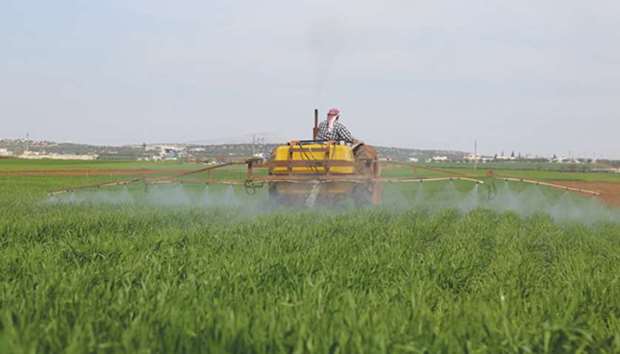Some 17,697 families (88,485 people) of farmers in eight Syrian governorates have benefited from a Qatar Red Crescent (QRCS) development project, which aims to support wheat crop growing in the war-torn country.
The end of July saw Syrian farmers harvesting more than 24 tonnes of wheat, a strategic factor of food security for local populations.
In a statement, QRCS said the project was carried out in co-operation with the General Organisation for Seed Multiplication (GOSM), Assistance Co-ordination Unit (ACU) and the Food and Agriculture Organisation (FAO) of the United Nations (UN), with support from Qatar Fund for Development (QFD).
Half of the project’s $6.3mn funding was provided by QRCS while GOSM and ACU gave 25% each.
A total of 7,733.5 hectares of agricultural land was cultivated in eight governorates – Aleppo, Idlib, Homs, Hama, Daraa, Quneitra, Damascus and Rif Dimashq.
“Harvesting is the culmination of the project. Over 45 days, the farmers have been harvesting and packing wheat for the purpose of producing bulgur and flour, among others,” QRCS said.
According to the plan, QRCS will purchase a portion of the crop at a “reasonable price”. Some 75% of the wheat will be used in producing bread while 25% will be purified and resold to the farmers at minimal prices for the coming season. This percentage, which equals to 6,000 tonnes of seeds, will be used to cultivate 24,000 hectares.
QRCS secretary-general Ali Hassan al-Hammadi said the project is a major component of the food security strategy of the three partners.
“It pursues the set goals and activities of food security under the UN Humanitarian Response Plan 2016,” he stressed.
“The three partners worked closely together to reinvigorate the local market and reduce poverty in the target areas, which suffer from food shortages and low wheat productivity,” al-Hammadi noted.
A $4mn fund was established to give the farmers zero-interest loans to purchase agricultural resources. The loans are either in cash or in-kind (seeds and fertilisers, among others) and are repaid from the produced wheat.
The project also aims to improve quality by offering incentives for farmers depending on the purity of the harvest. Also, 13 species of wheat were preserved and three species were restored by importing seeds from approved suppliers.
Al-Hammadi thanked QFD for contributing 50% of QRCS’ funding, which enabled it to add extra 3,000 hectares of the total cultivated land.
“QFD plays a central role in our Syria operations with positive results for millions of displaced Syrians,” he said.

A total of 7,733.5 hectares of agricultural land was cultivated in eight Syrian governorates.
